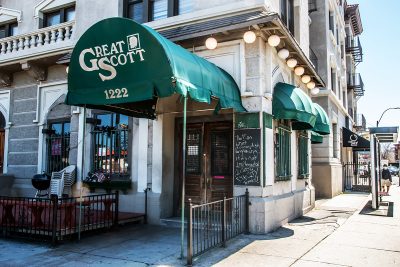For 44 years Bostonians frequented Great Scott, swigging drinks and enjoying live music at the iconic local favorite. Now, the venue’s doors stay shut — this time permanently.

The underground indie locale, seated in Allston and prominent in the Boston music scene, had initially cancelled or postponed all shows since March 13 due to coronavirus concerns and state bans on non-essential gatherings.
But on May 1, General Manager Tim Philbin posted a notice on Facebook announcing that Great Scott, a beloved spot for many local bands, artists and a “loyal group of customers,” would not be reopening. Philbin’s Facebook post has over 300 comments from longtime concertgoers and bands that originated in Boston.
Olivia West, the singer-songwriter behind Edge Petal Burn, played one of the last shows at Great Scott on March 10 with band Stealing Sheep before the building first closed. While Great Scott was a stepping stone for upcoming DIY bands to gain notoriety, West said the venue was also a fan-favorite neighborhood hangout.
“It’s a really good platform for local artists to be able to play,” West said. “Between the cops shutting down house venues, college students constantly moving, rent being raised and less and less spaces for artists to play, it’s really important to have an artist space, a place where people can make music.”
Besides music performers, Great Scott hosted $5 comedy nights each Friday called The Gas, which featured Boston-based comedians.
Rob Crean, who hosted the comedy nights for nearly 14 years, recorded two of his albums at The Gas and witnessed other stand-up comics such as Tig Notaro, Hannibal Buress and Marc Maron outgrow the venue and rise into great popularity.
“I was there almost every Friday for a huge percentage of my life,” Crean said. “That was always my flagship show, the show that defined what I was doing as a comedian and a comedy producer.”
Great Scott stood as a Bostonian landmark for comedians and artists alike. Indie folk duo Gentle Temper, composed of musicians Marion Earley and Ryan Meier, last played Great Scott on March 4, but the group has frequented the stage since its first performance at the venue in 2016.
“It’s just an established, important place in the Boston music community,” Earley said. “And it’s such a staple of the Allston scene too, it’s always been there. It feels weird to think about it not being there.”
Meier described the space as a “malleable” one — Great Scott was home to dance nights, sketch classes, barbecues, 18+ shows and more. It was a renowned musical and community space in Allston and “a necessary tier for artists,” Meier said.
Both Meier and Earley said they have signed a petition to keep Great Scott open. The petition, which currently has close to 25,000 signatures, requests that city councilors advocate for entertainment venues by communicating with building owners and landlords.
Due to these financial constraints on independent music outlets, West said Great Scott’s closure represents not only a loss of performance space for small artists, but also the growing gentrification in Boston.
“We don’t have many places left to make [music]. What artists want to stay around a city that doesn’t have any venues left for us?” West said. “This is supposedly a big college city, we’re supposed to be really educated, yet we don’t have creative spaces and we’re actively pushing them away.”
Meanwhile for Crean, the end of Great Scott only signifies the beginning of darker days for the proliferation of arts — the first of many similar venue closures in the local entertainment scene, he said.
“I think it’s important to also realize that this is just the tip of the iceberg,” Crean said. “For the arts, live entertainment, I don’t know when it’s coming back, but it’s not going to be for a long time. It may never go back to the way it was, which is really frustrating for someone like me who’s made my living as a performer.”

























































































































